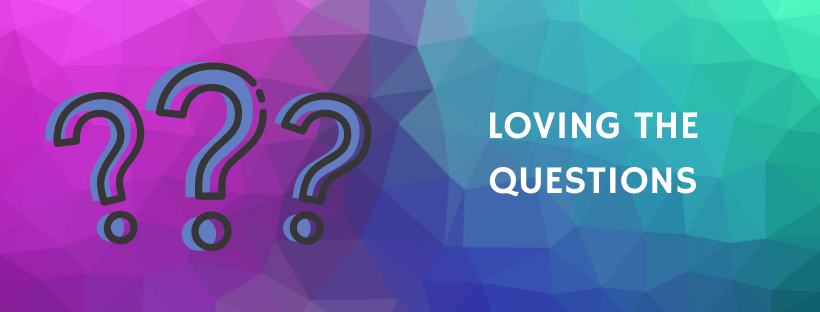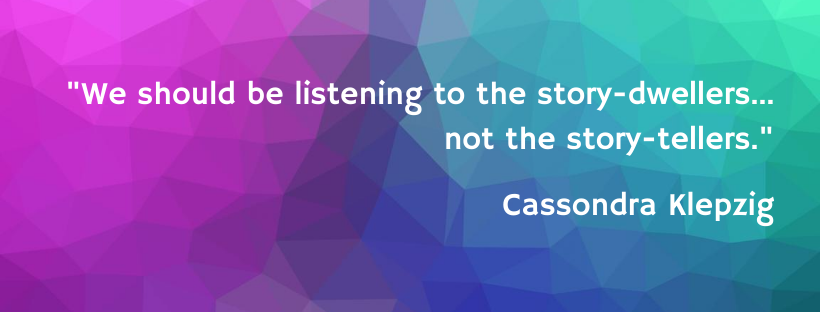Following is the latest set of reflections in my ongoing series on teaching “Storytelling and Communicating for Change” in the University of Vermont Masters of Leadership for Sustainability (MLS) program. The MLS program is for people who suspect there’s more to leadership than “maximizing potential” and “measuring progress.” It’s for those who want to open themselves to new and other ways of knowing – people ready to explore practices inspired by the wisdom of nature that challenge forces of domination and oppression.
I teach because the students always remind me how important it is to continue to love the questions. Below are some excerpts from my engagements with them this semester. You can see my previous posts from the last few years here.

None of us are islands
Does the hero’s journey reinforce dominant culture narrative frames of individualism, and frankly narcissism? Does a hero’s journey make people feel responsible for solving problems alone? Does a hero’s journey reinforce desires for individual recognition/credit? Does a hero’s journey remove accountability to the people in their family/community/nation to grow and develop – not just for themselves but for others in their life? Does a hero’s journey ignore the need to develop skills/time/resources to collaborate?
Perhaps it’s revolutionary not to feed the ego of where content and helping meet. What does it mean to communicate about social change without relying on the trope that someone else is “lacking” or “beneath” and that the reader/viewer is “needed” or the sky will fall? Can we subvert the assumed hierarchy/dependency?
At this time especially, can the hero’s journey be retold in ways that don’t erase the need for collective action to make change? How can the hero no longer be portrayed as singular in what they are up against and in what they achieve?
Gaps can be good
What if…we don’t have to be “the expert” anymore, as we do when researching, reporting, and using rhetoric? What if we gave ourselves permission to craft a story using only what we know? In a story, there can be gaps.
Can we be more honest about what we don’t know? Can we love a character, and never have met them? How can stories allow the reader/viewer to gain their own insights?
The role of intimacy in storytelling
“If we think of story as a source of nurturing that is necessary, it becomes apparent that we cannot become true human beings for ourselves and for each other without story.” ~Tiffany Torres
Does a writer’s connection to and intimate knowledge of a person allow them to share a more complete picture of who she is? What happens when outsiders are tasked with writing stories to promote ideas, issues, or concepts, rather than a grounded representation of a person’s life? How can this be shifted? It’s really tough to capture the wholeness of any one person, especially when what you’re writing has to serve an agenda, investigate an issue or organization, or deliver on already-set expectations. And given that, how do we avoid and/or mitigate this in our storytelling?
Trusting your voice
Step one is finding our voice, and then understanding if/when/how to use it. In my own experience, when that inner/public voice becomes aligned, it no longer matters whether I’m writing or speaking, extemporaneous or prepared, or even, really, to whom I’m communicating with, because I have begun to trust what will arrive through it. When critique came in in the early days of my blog, for example, I cannot say that they didn’t sting. But over time, I learned to see those external opinions offered as an invitation to further reflection and learning, and the “failure” calculation changed.
A cherished mentor of mine also illuminated for me that my voice is not only mine, that it can contain multitudes, and it can be experienced and expressed within relationship to others. That was a break from an important break from isolation/individualism and fear of failure that I needed at the time, and sometimes still need. It also made the endeavor of communicating my truths much less lonely as well. There’s an accountability and a humility built into viewing my own voice that way that now that I rely on (and sometimes still fail with).
Personally I have realized that I became a writer because of a unfulfilled need to be seen (and because words just naturally give me lots of delight). And the older I get, the more I understand that seeing myself is the more vital part of the kind of writing/speaking that I long to create.
Who is “we”?
It is important to take particular care when we write for the public and use the 1st person “we”, to be very intentional about not generalizing to one experience.
Rhetorical language calls up “we,” but often it is more accurate to speak from the “I.” There is no universal experience of race, class, gender, etc. so it is incumbent upon those of us with dominant culture privileges in particular to be very intentional when we use “we” and pay attention when/where we represent those who may not feel included in our particular identities. It’s subtle stuff, but important not to speak for others, as we aim to create a feeling of unity/action around an issue.
Both kinds of writing, for both insiders and outsiders, are necessary, but they are distinct. To write something for an insider audience, that is already a self-selected, self-identified group, means we risk not reaching people across different interests. (Even among insiders, I also don’t want to obscure there are many kinds of differences.) When we write for “outsiders”, we have to focus on what shift is needed in public opinion or action, ensuring our language is accessible and clear.

Who is “they”?
How is villainizing impacting our public discourse? The dominant culture portrays only having win/lose, either/or choices, and we know these are false options when it comes to transformation and accountability and collective action. It often requires a deep sense of humility to view us all – especially and first ourselves – as in need of healing and to have our actions serve repair and restoration in this time. What questions/ideas do you have about your role in using stories and storytelling to ensure call out culture doesn’t curtail deeper dialogue and opportunities for healing?
What is needed to mature the public discourse in the age of social media? The “why” of storytelling – considering why you want a reader/listener to be with you and what you hope they can gain/connect to their own experience – is an essential shift that I believe we need. I think “the why” enables the collective to form or find itself in alignment (or not). Can focusing on the specificity of our own lived experience reveal what is universal? How do we stop promoting our viewpoints and convincing others, and start inviting them to understand us (and hopefully more of themselves)?
Speaking of maturing…
How can those of us with active (addicted?) online lives who are wanting to pull back from constant consumption of information, also acknowledge and fulfill our desire to stay engaged? When everything(!) in the public sphere/media is portrayed as urgent, how does someone discern between what indeed needs immediate action and what is non-critical?
What if communicators could release the energy of grabbing (controlling?) people’s attention and opinions, and instead shine/share our truth/love so that people are attracted to us, and so that we are able to stay fully in our own integrity and authenticity? What could communications strategy look like then?
“What if the goal were to open a reader’s mind to new possibilities that are enticing enough that they might start doing their own research or begin to untangle the internalized oppressive narratives from their minds and bodies? When thinking about the timescales of larger liberative movements, how can I place the right bit of pressure or opportunity for opening, to push a few people over the edge of the precipice they are already standing at, but could chose comfort instead?” ~Margaret Williams
When communicators are humbled
As someone who has been working in communications for a loooong time, I am still grappling with what’s the “right” words or images that can be used to move more people on an issue. And then, I remember…movements. It is the work of social movements to change societal narratives – that is ultimately their purpose, alongside dismantling systems of oppression through policy change and other expressed goals. And seen since the Black Lives Matter uprisings earlier this year, it works. Public expectations change.
No word or image that I or any other individual communicator could have chosen would have moved more people over the tipping point on defunding the police the way George Floyd’s murder has. Now, “is it actually a tipping point?” and “there’s so much more work to do”…yes, yes. But in many ways, these flash point moments should humble communicators. We don’t always have to know the how. We just have to remain consistent, collaborative, aligned, and receptive to making sure people can hear the why (the shared values we stand for) in everything we do.
***
Related Posts
Reimagining Nonprofit Communications in a Hyper-Connected World
#GivingTuesday is over: Now what to do about those objectionable fundraising messages
My conflicted relationship to “expertise”
11 (still!) useless approaches to communicating about global development
10 “big picture” communications questions for the social good sector
Is “poverty porn” making a comeback?
Are the jobs of communicators changing in the development sector?
How NOT to respond to bad press: Thoughts for my fellow aid workers (and former colleagues)
The power of the pen: Why I left M&E behind for communications


Hi Jennifer,
I appreciate the work you have put into and are putting into How Matters. It is a relief to read and this article, in particular, touches on some key grains of truth – here is to those grains being nurtured and grown into the change that is needed.
This is a strange and tough time but yet an incredibly rich time; to glean those truths so easily overlooked or hidden in the shadows of busy lives. As I am trying to find my way, outside Philadelphia – seeking direction for this next chapter in my life, your calm insight is encouraging. Last month I fully realized how much my opinion really doesn’t matter and isn’t necessary much of the time (comments on a post or to another’s experience) but this past fortnight it came home that I don’t need ‘their’ opinions as to what I think either (again specifically was a post on a friends fb page) – saying this it is part of what I take from your article – living now, listening now, learning discomfort is ok and a good place to be sometimes, but that in what ever small way I will be my own change that my choices offer traction, support and energy to those I meet and greet.
Thank you,
Marcella